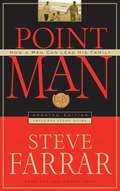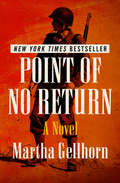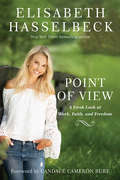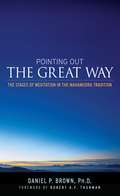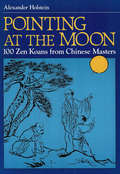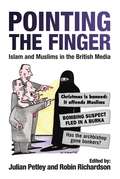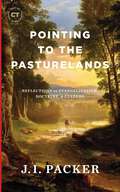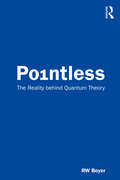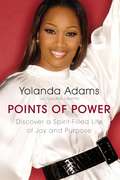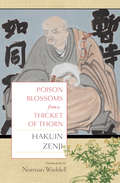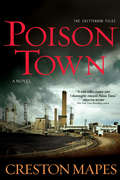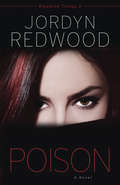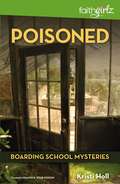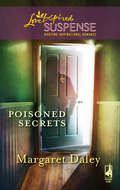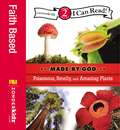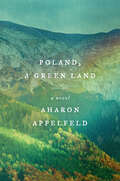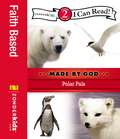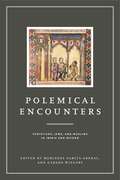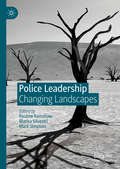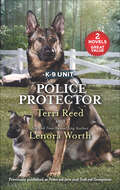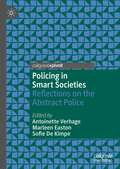- Table View
- List View
Point Man: How a Man Can Lead His Family
by Steve FarrarThis bestselling classic encourages and equips Christian men to lead their families successfully through hazards and ambushes like divorce, promiscuity, suicide, and drug addiction. Men will find practical insight on topics such as a father's influence, maintaining purity, and husband-and-wife teamwork. In this war, renowned men's author Steve Farrar emphasizes, Jesus Christ is looking for men who will not die, but live for their families.From the Trade Paperback edition.
Point of No Return: A Novel
by Martha GellhornA US soldier confronts the horrors of the Holocaust in this New York Times–bestselling novel from acclaimed WWII correspondent Martha Gellhorn. Growing up in St. Louis, Missouri, Jacob Levy is a typical American boy. He never gives much thought to world affairs—or to his Jewish heritage. But when the United States joins the Allied effort to stop Hitler, Jacob&’s life and sense of identity are on course to change forever. As a soldier in the last months of World War II, Jacob lives through the Battle of the Bulge and the discovery of Nazi concentration camps. Witnessing the liberation of Dachau, he confronts a level of cruelty beyond his own imaginings, and the shock transforms him in ways he never thought possible. One of the first female war correspondents of the twentieth century, Martha Gellhorn visited Dachau a week after its discovery by American soldiers. A New York Times bestseller when it was first published, this powerful novel grapples with the horrors of war and dilemmas of moral responsibility that are just as relevant today. This ebook features an afterword by the author.
Point of View: A Fresh Look at Work, Faith, and Freedom
by Elisabeth Hasselbeck Candace Cameron BureRecognized from her roles on Survivor, The View, and FOX & Friends, celebrity Elisabeth Hasselbeck presents a deeply intimate journey of faith, told through the important moments in her life."Point of view," by definition, is a particular attitude or way of considering a matter. Through her nearly two decades of broadcasting, Elisabeth learned the necessity of extracting the point of view of the person being interviewed on a particular topic or subject or experience. Doing so allows you to see issues and truths through another's eyes. It requires a shift in perspective to see the story through their lens. In this illuminating book, Elisabeth walks through the times--from her national celebrity days to her newest role as CBO (Chief Breakfast Officer)--where she saw something differently than how God wanted her to, and the path back to His point of view was sometimes rocky but always revealing. Sometimes God's intentions for her were clear, yet other times she encountered situations so uncomfortable and blurry that she could only ask for His wisdom. In this book, Elisabeth welcomes you into the many different, and often divergent, points of view that she has witnessed and learned from along the way. It is a journey that brought her to the ultimate point of view that she discovered in the Word of God--that until she sees herself as He sees her, she is not seeing at all. As you read through the pages here, she invites you to make the same discovery for yourself.
Pointing Out the Great Way
by Robert Thurman Daniel P. BrownMany books have been published in recent years on the topic of mahamudra, or meditation on the fundamentally clear nature of the mind. This book is different in the systematic way it draws from a variety of source texts in order to construct a complete, graded path of practice informed by an understanding of the particular obstacles faced by meditators in the West. Dan Brown is a clinical psychotherapist who has also spent much time evaluating the experiences of meditators on longterm retreats. He knows the Tibetan literature on mahamudra meditation and has over thirty years of both personal meditation experience and observation of the experiences of others. He co-wrote, with Ken Wilber and Jack Engler, the book Transformations in Consciousness, and he teaches an annual seminar on mahamudra meditation at the Esalen Institute. Pointing Out the Great Way is a spiritual manual that describes the Tibetan Buddhist meditation known as mahamudra from the perspective of the 'gradual path.' The gradual path is a progressive process of training that is often contrasted to sudden realization. As such, this book contains a step-by-step description of the ways to practice, precise descriptions of the various stages and their intended realizations, and the typical problems that arise along with their remedies. Simply put, mahamudra meditation involves penetrative focus, free of conceptual elaboration, upon the very nature of conscious awareness. A unique feature of this book is its integrative approach to the stages of mahamudra meditation. A number of works on Buddhist meditation stages in general and mahamudra meditation in particular are already available in English, yet none, single text or commentary on the stages of mahamudra meditation, captures the inner experience of these stages in sufficient detail to convey its richness. This book represents the needed alternative by integrating material from a variety of root texts, practical manuals,
Pointing at the Moon
by Alexander HolsteinPointing at the Moon comprises one hundred brilliant examples of the Ch'an masters' questions and answers from the following four treatises of the Ch' an tradition: A Selection From the Five Books of the Ch 'an Masters' Sayings, The Light of the Ch 'an Sayings Recorded in the Year if Developing Virtue (A.D. 1004), The Ch'an Sayings Recorded During the Moonlit Meditation, and An Anthology if Ch'an Sayings,
Pointing at the Moon
by Alexander HolsteinPointing at the Moon comprises one hundred brilliant examples of the Ch'an masters' questions and answers from the following four treatises of the Ch' an tradition: A Selection From the Five Books of the Ch 'an Masters' Sayings, The Light of the Ch 'an Sayings Recorded in the Year if Developing Virtue (A.D. 1004), The Ch'an Sayings Recorded During the Moonlit Meditation, and An Anthology if Ch'an Sayings,
Pointing at the Moon
by Alexander HolsteinThis collection of Zen koans with extensive commentary will be of great interests to followers of Zen Buddhism.People around the world value the mind-cleansing, spiritually uplifting benefit to be gained through the practice of Cha'an (Zen) Buddhism. Central to Zen is the enigmatic koan (kung-an), a kind of riddle used by masters to shock their students into greater awareness. In this timeless collection from Chinese masters, translations of 100 of these question-and-answer riddles are presented. Each koan is followed by the author's commentary, which provides fascinating insight into the background and deeper meanings of the koans.Pointing at the Moon contains zen koeans from the following four treatises of the Zen tradition: A Selection From the Five Books of the Zen Masters' Sayings The Light of the Zen Sayings Recorded in the Year if Developing Virtue The Zen Sayings Recorded During the Moonlit Meditation An Anthology if Zen SayingsEnhanced by the 85 beautifully sketched Chinese brush paintings, Pointing at the Moon is a text certain to stimulate and challenge anyone interested in learning more about Zen and its tradition of spiritual enlightenment.
Pointing the Finger: Islam and Muslims in the British Media
by Julian PetleyEver since 9/11, Muslims and Islam have dominated the headlines in the UK. With one leading newspaper describing the Muslim community as a "troublesome minority", the media has often been accused of hostility. In this illuminating study, several leading commentators examine the phenomenon of "Islamophobia" and ask how to tackle it. Charting recent media controversies and including interviews from Muslim journalists, this is a captivating insight into how Muslims are depicted in the West. Julian Petley is professor of Film and Television at Brunel University. Robin Richardson is Co-director of the Instead consultancy and author of Islamophobia.
Pointing the Way
by Martin Buber Maurice S. Friedman"These essays, written between 1909 and 1954 and first published as a collection in 1957, in which the eminent philosopher relates the 'I-Thou' dialogue to such varied fields as religion, social thought, philosophy, myth, drama, literature and art, reveal Buber in the process of responding to the crises and challenges of the 20th century and enable the reader to follow his lifelong struggles toward 'authentic existence.'" -Back Cover
Pointing to the Pasturelands: Reflections on Evangelicalism, Doctrine, & Culture (Best of Christianity Today)
by J. I. PackerAll theology is doxology. Anglican theologian J. I. Packer was one of the most widely respected Christian writers of the twentieth century. Author of over forty books and named one of the most influential evangelicals by Time magazine and the readers of Christianity Today, Packer's impact is immense. He was known for profound theological writing that was always lively and worshipful. Pointing to the Pasturelands recovers several decades of Packer's contributions to the pages of Christianity Today. This includes his editorial columns, longer articles, and brief answers to readers' theology questions. The book concludes with a profile of Packer from Mark A. Noll. Enjoy timeless insights from a man whose life was devoted to knowing God and making him known.
Pointless: The Reality behind Quantum Theory
by RW BoyerThis book examines how major interpretations of quantum theory are progressing toward a more unified understanding and experience of nature. It offers subtle insights to address core issues of wave-particle duality, the measurement problem, the mind/body problem, determinism/indeterminism/free will, and the nature of consciousness. It draws from physics, consciousness studies, and ‘ancient Vedic science’ to outline a new holistic interpretation of quantum theory. Accessible and thought-provoking, it will be profoundly integrating for scholars and researchers in science and technology, in philosophy, and also in South Asian studies.
Points of Power: Discover a Spirit-Filled Life of Joy and Purpose
by Yolanda Adams Lavaille LavetteOver five million listeners tune in to hear Yolanda Adams's Points of Power , a segment in her daily radio show that inspires people by applying biblical truths to present-day realities. In her first book, Yolanda Adams transfers that winning segment into a reader's delight. In this highly accessible manual for daily living, she shares stories from her and others's personal experiences, showing readers how to access God's love and grace in their modern world and troubles. By revealing how Yolanda and other human beings have transcended the world's difficulties, POINTS OF POWER empowers readers to face trouble with confidence in the God who never fails.
Poison Blossoms From a Thicket of Thorn: The Great Zen Record Of Zen Master Hakuin
by Norman Waddell Hakuin ZenjiHakuin Enkaku Zenji (1686-1769) was one of the greatest Zen masters to ever live. In additional to being the author of the most famous koan ever written, "What is the sound of one hand clapping?" he is credited with reviving the Rinzai sect of Zen in Japan, perhaps the most important and most rigorous branch in the Golden Age of Buddhism. His "Song of Zazen" is chanted in monasteries daily all over the world. Hakuin taught that there are three essentials to Zen practice: Great Faith, Great Doubt, and Great Resolve. Only Dogen comes close to matching the power and breadth of his writing and teaching.Norman Waddell has spent his life reading and commenting on the vast work of Hakuin. He has published several previous selections, all leading to his work on this major, monumental gathering, the Keiso Dokuzui, never before translated in any foreign language. Translating sacred texts requires years of practice and intimate familiarity with the material in its original language, as well as complete mastery of the available commentary. There's no one alive better capable of handling this important and difficult offering.For this collection Hakuin gathered more than 200 individual pieces, consisting of commentaries, memorials, poems, koans, and teisho (lectures). They were offered to the many students living around his temple as well as to the countless lay followers around the country, and Hakuin spent his life offering these teachings together with his own commentary. Result is an organic, growing collection of understanding and advice, certain to engage Zen students as well as religious practitioners in other spiritual disciplines.
Poison Town
by Creston MapesThere's More Than One Kind of Poison in This Town People are sick and dying. Rumors are swirling. Some claim chemicals leaking from a manufacturing plant are causing the cancer that's crippling people on the poor side of Trenton City, Ohio. Yet nothing at the plant appears amiss. The problem remains a mystery until reporter Jack Crittendon's long-time mechanic falls ill and he investigates. Soon Jack becomes engulfed in a smokescreen of lies, setups, greed, and scandal. The deeper he digs, the more toxic the corruption he uncovers. As he faces off with the big-time players behind the scenes and tries to beat the clock before more people die, he realizes the chillingly unthinkable--he knows too much.
Poison: A Novel
by Jordyn RedwoodFive years ago, Keelyn Samuels's armed, mentally ill stepfather took her family hostage in their house in rural Colorado. She and her half-sister Raven made it out alive, but others did not. Authorities blamed the father's frequent hallucinations about a being named Lucent, but in the end, even the best of the FBI's hostage negotiators failed to overcome the man's delusions and end the standoff peacefully.SWAT team member Lee Watson was there that day. He watched it all unfold and was able to pull Keelyn and Raven from the grip of their demon-possessed father. Though partially successful, his team had still failed, and the outcome of that day--and that tortured family--has continued to plague Lee ever since. Though unusual for SWAT to reconnect with survivors, Lee bumped into Keelyn two years after the crisis, and they both found some peace in their budding relationship. But peace is hard to maintain when the memory returns . . . in the flesh.Lucent is back, and he's no hallucination. In fact, he is a very real person with dangerous motives. He has kidnapped Raven's daughter, and--Keelyn worries--maybe has hurt Raven as well. Though she is estranged from her sister, Keelyn feels the immediate need to find Raven and save what family she has left. But when others who were involved in that fateful day start dying, some by mysterious circumstances, Keelyn wonders if she and Lee can emerge unscathed a second time.The highly anticipated second installment of the Bloodline Trilogy explores the boundaries of faith and family and what happens when both are put to the test.
Poisoned
by Kristi HollWhen a group of Jeri McKane’s friends help Abby present a birthday dinner for her home-ec project, the party ends up in the trashcan … literally. Is it just an unfortunate event, or have the friends been intentionally poisoned? Jeri’s instinct says something isn’t right, and the girls follow a trail that leads to some not-so-sweet evidence. Tween girls can wonder why God doesn’t step in when meanness and injustice happens. This story helps them see how he often uses ordinary people to help uncover the truth!
Poisoned Secrets
by Margaret DaleyMaggie Ridgeway has spent years searching for her birth mother. And now, thanks to an anonymous tip, she's finally found her. Taking the apartment across the hall from her mother's family, Maggie is determined not to leave until she gets some questions answered. Who is her father? Why did her parents abandon her? And what item in her new apartment is provoking multiple burglaries? After an interrupted break-in leaves Maggie unconscious, the building's owner, Kane McDowell, promises to protect her. But then he learns who she really is. When the past is unveiled, the shocking disclosures could tear Maggie and Kane apart.
Poisonous, Smelly, and Amazing Plants: Level 2 (I Can Read! #Level 2)
by Various AuthorsDid you know—The Venus Flytrap plant eats bugs? That the redwood is the tallest tree in the world? God's awesome world is filled with unusual plants!
Poland, a Green Land: A Novel
by Aharon AppelfeldA Tel Aviv shopkeeper visits his parents&’ Polish birthplace in an attempt to come to terms with their complex legacy—and is completely unprepared for what he finds there.Yaakov Fine&’s practical wife and daughters are baffled by his decision to leave his flourishing dress shop for a ten-day trip to his family&’s ancestral village in Poland. Struggling to emerge from a midlife depression, Yaakov is drawn to Szydowce, intrigued by the stories he'd heard as a child from his parents and their friends, who would wax nostalgic about their pastoral, verdant hometown in the decades before 1939. The horrific years that followed were relegated to the nightmares that shattered sleep and were not discussed during waking hours.When he arrives in Krakow, Yaakov enjoys the charming sidewalk cafes and relaxed European atmosphere, so different from the hurly burly of Tel Aviv. And his landlady in Szydowce—beautiful, sensual Magda, with a tragic past of her own—enchants him with her recollections of his family. But when Yaakov attempts to purchase from the townspeople the desecrated tombstones that had been stolen from Szydowce&’s plowed-under Jewish cemetery, a very different Poland emerges, one that shatters Yaakov&’s idyllic view of the town and its people, and casts into sharp relief the tragic reality of Jewish life in Poland—past, present, and future.In this novel of revelation and reconciliation, Aharon Appelfeld once again mines lived experience to create fiction of powerful, universal resonance.
Polar Pals: Level 2 (I Can Read! #Level 2)
by ZondervanThese exciting photos and facts show children the wonders of God’s creation. Includes simple text perfect for level two readers. Titles include: Rainforest Creatures; Under the Sea; Birds of the Air; Bugs, Bugs, Bugs; Freezing Friends; and Creatures Down Under. Rainforest Creatures features unusual yet familiar animals like the sloth and the tree kangaroo and facts about their habitat. Under the Sea will feature facts about sea creatures such as the giant squid, baseball fish, and the blue-ringed octopus. Birds of the Air will include facts about flying friends like the macaw, toucan, flamingo, and yellow-bellied sapsucker. Bugs, Bugs, Bugs will tell about stinkbugs, dung beetles, killer bees, and more. Creatures Down Under will tell about the platypus, kookaburra, kangaroo, and crocodile and coral. Freezing Friends will focus on Polar bears, seal, penguin, and walrus. Farm Animal Babies will focus on familiar farm animal babies, their special names, and characteristics. Forest Animal Babies will focus on fun forest animal babies like raccoons, mountain lions, and baby birds and their special characteristics. Jungle Animal Babies will focus on fun jungle animal babies like monkeys, panthers, and baby birds and their special characteristics.
Polemical Encounters: Christians, Jews, and Muslims in Iberia and Beyond (Iberian Encounter and Exchange, 475–1755 #2)
by Mercedes García-Arenal Gerard WiegersThis collection takes a new approach to understanding religious plurality in the Iberian Peninsula and its Mediterranean and northern European contexts. Focusing on polemics—works that attack or refute the beliefs of religious Others—this volume aims to challenge the problematic characterization of Iberian Jews, Muslims, and Christians as homogeneous groups.From the high Middle Ages to the end of the seventeenth century, Christian efforts to convert groups of Jews and Muslims, Muslim efforts to convert Christians and Jews, and the defensive efforts of these communities to keep their members within the faiths led to the production of numerous polemics. This volume brings together a wide variety of case studies that expose how the current historiographical focus on the three religious communities as allegedly homogeneous groups obscures the diversity within the Christian, Jewish, and Muslim communities as well as the growing ranks of skeptics and outright unbelievers. Featuring contributions from a range of academic disciplines, this paradigm-shifting book sheds new light on the cultural and intellectual dynamics of the conflicts that marked relations among these religious communities in the Iberian Peninsula and beyond.In addition to the editors, the contributors are Antoni Biosca i Bas, Thomas E. Burman, Mònica Colominas Aparicio, John Dagenais, Óscar de la Cruz, Borja Franco Llopis, Linda G. Jones, Daniel J. Lasker, Davide Scotto, Teresa Soto, Ryan Szpiech, Pieter Sjoerd van Koningsveld, and Carsten Wilke.
Polemical Encounters: Christians, Jews, and Muslims in Iberia and Beyond (Iberian Encounter and Exchange, 475–1755)
by Ryan Szpiech Linda G. Jones John Dagenais Gerard Wiegers Thomas E. Burman Antoni Biosca i Bas Mònica Colominas Aparicio Óscar de la Cruz Borja Franco Llopis Daniel J. Lasker Davide Scotto Pieter Sjoerd van Koningsveld Carsten WilkeThis collection takes a new approach to understanding religious plurality in the Iberian Peninsula and its Mediterranean and northern European contexts. Focusing on polemics—works that attack or refute the beliefs of religious Others—this volume aims to challenge the problematic characterization of Iberian Jews, Muslims, and Christians as homogeneous groups.From the high Middle Ages to the end of the seventeenth century, Christian efforts to convert groups of Jews and Muslims, Muslim efforts to convert Christians and Jews, and the defensive efforts of these communities to keep their members within the faiths led to the production of numerous polemics. This volume brings together a wide variety of case studies that expose how the current historiographical focus on the three religious communities as allegedly homogeneous groups obscures the diversity within the Christian, Jewish, and Muslim communities as well as the growing ranks of skeptics and outright unbelievers. Featuring contributions from a range of academic disciplines, this paradigm-shifting book sheds new light on the cultural and intellectual dynamics of the conflicts that marked relations among these religious communities in the Iberian Peninsula and beyond.In addition to the editors, the contributors are Antoni Biosca i Bas, Thomas E. Burman, Mònica Colominas Aparicio, John Dagenais, Óscar de la Cruz, Borja Franco Llopis, Linda G. Jones, Daniel J. Lasker, Davide Scotto, Teresa Soto, Ryan Szpiech, Pieter Sjoerd van Koningsveld, and Carsten Wilke.
Police Leadership: Changing Landscapes
by Marisa Silvestri Mark Simpson Pauline RamshawThis book draws upon a range of theoretical and empirical research to explore contemporary debates about police leadership. Focusing upon leadership styles, ethics, integrity and professionalism, workforce diversity, legitimacy and accountability, it reviews the changing context and nature of leadership over time and explores the gains, losses, tensions and challenges that different leadership models bring to policing. Leadership is present at various levels within the police service and this collection reflects upon appropriate leadership qualities and requirements for different roles and at different ranks. The book also considers the difference between leadership and management in an attempt to capture fuller debates within police leadership. Part one surmises the contextual backdrop to current thinking and the primary challenges facing leadership in the police service. Part two highlights the changing face of leadership through an exploration of the call for greater diversity within the ranks of police leadership, and the final section examines police leadership beyond England and Wales. Through this, Police Leadership explores how the challenges facing police leadership in England and Wales share similarities with those in Scotland, Northern Ireland, Greece, North America, and Australia in the face of the pressures of political and economic uncertainty.
Police Protector: Protect And Serve Truth And Consequences (K-9 Unit)
by Lenora Worth Terri ReedEnjoy two action-packed page-turners featuring K-9 crime-stoppers solving thrilling mysteries that will keep you on the edge of your seat!These lawmen solve the toughest cases with the help of their brave canine partners.Protect and ServeWhen rookie K-9 officer Shane West finds the lead police dog trainer murdered, he’s determined to find the killer. Then he discovers Gina Perry hiding nearby—a pretty junior trainer who had the motive, means and opportunity to kill her boss. Gina insists her troubled brother is the real murderer. And when Gina’s brother comes after her, Shane is assigned to protect her and uncover the truth.Truth and ConsequencesFormer army medic David Evans heads to Arizona to check up on a fallen comrade’s sister, but when he arrives in Desert Valley, David witnesses a drug run gone wrong. And when the police show up, the investigating officer is the woman he’s supposed to look after. K-9 officer Whitney Godwin insists she can take care of herself and her infant daughter. But the criminals want both David and Whitney permanently silenced…
Policing in Smart Societies: Reflections on the Abstract Police (Palgrave's Critical Policing Studies)
by Antoinette Verhage Marleen Easton Sofie De KimpeSmart societies pose new challenges for police organizations. Demands for more efficiency and effectiveness test police organizations which are often resistant to change. This book uses the concept of the abstract police to describe the way in which police organizations have tried to adapt to these new evolutions and the consequences. The chapters stem from a conference called “Street Policing in a Smart Society” which sought to frame and analyse these developments in policing. In this book, the concept of the abstract police is introduced, analysed and then challenged from different angles, looking at the evolutions related to technology, plural policing, police discretion and police decision making. As such, the book is a reflection of current debates on policing and police organization, aiming to give input to the debate by providing new insights on police and police work.
